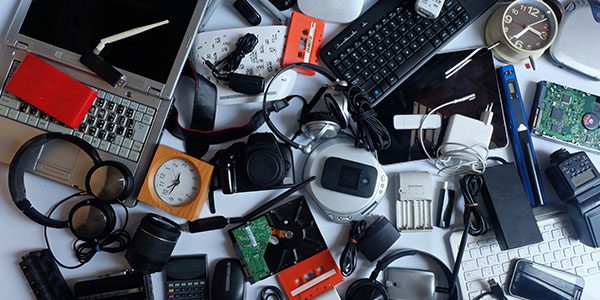Elevate Your E-Waste Monitoring With R2 Accreditation: an Extensive Introduction
In the realm of responsible electronic waste management, the value of implementing effective techniques can not be overstated. As innovation rapidly advances, the requirement for appropriate disposal and recycling of electronic devices has become significantly vital. One secret approach to raise e-waste management practices is by acquiring R2 certification. This accreditation stands as a hallmark of quality in the area, indicating adherence to rigorous standards that make certain eco audio methods. By exploring the processes and advantages linked with R2 accreditation, a deeper understanding of how it can change e-waste monitoring methods emerges, losing light on a path towards sustainability and ethical disposal methods.
Relevance of E-Waste Management

When e-waste is not handled properly, these hazardous materials can seep right into the ecosystem, triggering damage to wild animals and potentially going into the food chain, posturing risks to human health. The inappropriate disposal of e-waste contributes to contamination and greenhouse gas exhausts, aggravating climate change and ecological destruction.

Advantages of R2 Accreditation

First of all, R2 qualification enhances trustworthiness by showcasing a company's commitment to lasting techniques. It assures consumers, partners, and stakeholders that the firm sticks to rigorous requirements for e-waste monitoring - r2 certification. This credibility can bring about boosted count on and boosted connections with customers who prioritize ecological responsibility
Second of all, R2 qualification helps minimize threats connected with improper e-waste disposal. By following the strict guidelines stated by the accreditation, companies can reduce the probability of data breaches, environmental contamination, and legal repercussions. This aggressive strategy safeguards the firm's reputation and lessens possible obligations.
Last but not least, R2 certification shows a dedication to ecological stewardship - r2 certification. By responsibly managing electronic waste through certified processes, companies add to the conservation of sources, reduction of pollution, and promo of a circular economic situation. This dedication not just profits the atmosphere yet additionally aligns with advancing consumer expectations for sustainable company practices
R2 Qualification Refine Summary
Having developed the advantages of R2 certification in promoting reliability, danger mitigation, and ecological stewardship, it is necessary to now outline the in-depth procedure associated with acquiring this certification. The R2 certification process starts with see this site an extensive testimonial of the company's operational policies and procedures to make certain compliance with the R2 criterion. This preliminary evaluation is vital in determining any type of spaces that need to be attended to prior to continuing additionally.
As soon as the organization's practices align with the R2 standard demands, an independent third-party auditor conducts an on-site audit to review the application and performance of these techniques. This audit consists of an extensive testimonial of documents, meetings with personnel, and physical examinations of facilities to verify conformity.
Adhering to a successful audit, the company obtains a certification decision based on the auditor's findings. If authorized, the company is approved R2 accreditation, demonstrating its dedication to accountable e-waste management. It is vital to note that maintaining R2 accreditation requires recurring compliance with the standard's requirements and routine audits to ensure continued adherence to ideal techniques in e-waste recycling and disposal.
Secret Standards for R2 Conformity
An essential element of attaining R2 compliance is guaranteeing that all electronic waste (e-waste) handling facilities meet rigorous ecological and safety and security requirements. To abide by R2 needs, companies need to abide by key standards that focus on liable e-waste management practices. These standards consist of executing a recorded environmental, wellness, and security monitoring system, guaranteeing the safe and secure handling of data-containing tools, and conducting detailed downstream due persistance to track the final location of e-waste materials.
Moreover, R2 conformity requires the proper screening, repair, and recycling of electronic tools to expand its beneficial life and minimize environmental influence. Facilities looking for R2 certification must additionally focus on employee health and wellness by giving needed training, personal safety tools, and a safe workplace. Furthermore, preserving comprehensive documents of e-waste processing activities and regularly undertaking audits by approved licensing bodies are vital components of demonstrating recurring compliance with R2 requirements.
Influences of Sustainable E-Waste Practices
The implementation of sustainable e-waste methods according to R2 compliance not only ensures ecological and safety and security standards are met but also considerably affects the general lifecycle of digital items. By adhering to R2 standards, digital waste management procedures come to be a lot more effective, lowering the environmental footprint of electronic products. Lasting e-waste techniques assist in the proper disposal of digital components, ensuring that unsafe products my sources are dealt with sensibly and do not wind up contaminating the environment.
Additionally, sustainable e-waste practices can contribute to task development in the recycling and refurbishment markets, cultivating financial development while advertising ecological duty. On the whole, the fostering of lasting e-waste techniques under R2 certification offers as a vital action in the direction of accomplishing a much more ecologically lasting electronics industry.
Conclusion
Finally, executing proper e-waste management techniques is crucial for ecological sustainability and source conservation. R2 qualification plays a crucial duty in making certain responsible handling and disposal of digital waste. By sticking to the rigid requirements stated by R2 standards, organizations can not just lessen their environmental impact yet additionally add to a more lasting future for generations ahead.
One secret method to boost e-waste monitoring methods is by obtaining R2 accreditation. By exploring the advantages and processes connected with R2 certification, a much deeper understanding of how it can revolutionize e-waste administration methods arises, dropping light on a path in the direction of sustainability and ethical disposal techniques.
The R2 accreditation procedure starts with a comprehensive review Going Here of the company's functional policies and treatments to guarantee conformity with the R2 requirement. If approved, the organization is granted R2 accreditation, demonstrating its commitment to responsible e-waste management. Generally, the fostering of lasting e-waste methods under R2 qualification serves as a crucial action towards accomplishing an extra ecologically lasting electronics market.